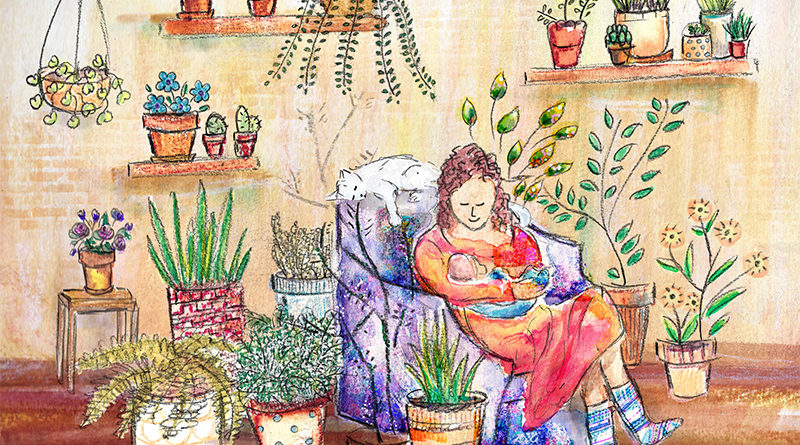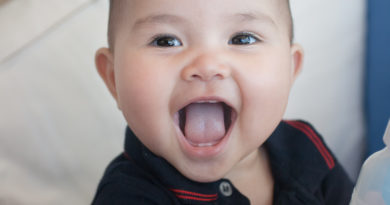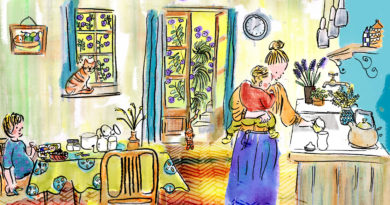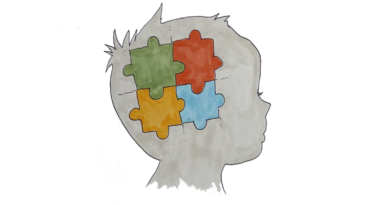Watch Me Grow
Throughout history the value of breastfeeding can be found in literary sources from ancient Greece, Rome the Near and Far East. Wet nurses were employed when mothers were unable to nurse their own babies. This has been well documented and can be read in holy scriptures. When Pharoah’s daughter found Moses in the reeds of the Nile, she was very happy take him as her own baby. But knowing the need for mother’s milk she asked for a wet nurse to be summoned so that baby Moses would survive and not starve.
We have said it before, but it bears repeating: breastmilk is one of the best gifts you can share with your baby and readily available at any time of the day or night. It requires practically no preparation, adapts to a growing baby’s needs and demands, and changes content during a feed; furthermore, according to the climate it becomes more fatty or liquid as most benefits the baby. As a baby becomes mobile and begins to touch and taste anything it can get its hands on, your breastmilk will begin to contain more protective antibodies to help fight infections and germs in a baby’s environment. Exclusive breastfeeding ensures that babies are better guarded against viral and other infections as the mother’s antibodies pass through her milk into the baby. And breast milk can help Baby grow and develop in the best way possible.
It could be said that breastmilk is a cornerstone of survival for both humans and the environment. Breastmilk is produced locally and requires no logistical transportation; it is sustainable in ways that formula simply is not. Numerous studies over many years provide evidence that breastfed babies are less likely to have gastroenteritis, respiratory and/or ear infections and many other illnesses. In areas where access to clean water, sanitation and health care is poor, many lives could be saved if breastfeeding replaced formula feeding.
Where water is a problem, the UNHCR (United Nations High Commissioner for Refugees) recommends that grandmothers attempt re-lactation in place of introducing formula, when a mother is no longer able to nurse her baby. In many parts of Africa where mothers are infected or dying from HIV/AIDS, this method has been recorded as a more desirable option for babies. Poor water used in formula can affect a baby’s growth. This can be seen in a photo published by UNICEF (1992, and attributed to Mustaq Khan in the book Mother’s Milk: Breastfeeding Controversies in American Culture). The subject is a mother who was advised that she only had enough milk to breastfeed her twin son, and that she had to use formula for her baby girl. As she only had access to poor-quality water for mixing the formula, and was probably also struggling to finance it as well, the twin girl was unable to thrive and grow like her brother. This extreme case shows how important it is to provide breastfeeding support for mothers. It is quite possible to successfully nurse twins and even triplets, if a mother is advised accordingly and accurately.
Breastfeeding also binds mother and child together, which brings about healthy development and a healthy future life. This issue is promoted by the World Health Organisation, who have recently issued guidelines on the importance of “Improving Early Childhood Development.” It states that the first three years of a child’s life have an impact on the child’s entire life.
The impact on the environment is also positive, as it requires less energy, packaging and transportation than formula. There are many benefits and joys that come with breastfeeding, and through supporting mothers who wish to breastfeed, we can all contribute towards something important and beneficial to babies. It is worth making the effort to see that our babies receive the greatest gift we can give them at the beginning of their lives. They will never have the same opportunity again.
By Joanna Koch
Joanna has been a La Leche League advisor since the early 1990s. A mother from one of her groups launched the idea of Mothering Matters (now Family Matters) in 1994, which has now developed into a successful online website, helping mothers, fathers and families over many years. Joanna has three children and eight wonderful, loving (and breastfed) grandchildren.
Illustration by Lemady Rochard
Lemady Rochard is an artist and illustrator living near Einsiedeln. She runs the Storycraft Studio near Zürich, where she offers themed art and craft classes and parties for children from 1.5-10 years old. She has two young children and in her spare time enjoys travelling and drinking lots of tea! She can also be found on her website and Facebook page.




